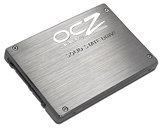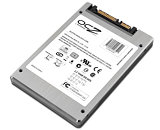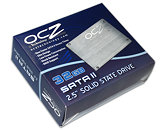Thursday, March 13th 2008

OCZ Introduces 32GB and 64GB High-Speed SATAII Solid State Drives
OCZ Technology today unveiled ultra-fast OCZ SATA II 2.5" Solid State Drives, a lightweight and efficient alternative to conventional hard disc drives. The OCZ SATA II drive is designed to stay abreast of the performance features of high-end notebooks, and is ideal for energy-efficient mobile computing. With blazing access times combined with excellent reliability, the OCZ SATA II 2.5" SSD is the answer for enthusiasts demanding the most advanced storage for their notebooks and systems."There are many benefits of solid state drive technology over traditional disk drives including superior speed, reliability, and power savings," commented Alex Mei, Executive VP and CMO, OCZ Technology Group. "Our newest SATA II drives are designed to further extend the advantages of this technology offering enhanced performance for high-end mobile solutions."
As enthusiasts seek out a more efficient and reliable forms of mass storage, OCZ SATA II SSDs are the ideal upgrade for energy efficiency, performance, and durability. High-speed and low power consuming NAND flash technology provides the necessary performance and battery life boosts generated by the proliferation of mobile gaming and new ultra-thin laptops.
At incredible capacities of 32GB and 64GB and premier speeds of 120MB/s read and 100MB/s write, OCZ SATA II SSDs enable enhanced productivity in your everyday computing and intensive multi-tasking applications. Featuring durable yet lightweight brushed alloy housing, OCZ SATA II 2.5" SSDs have no moving parts that are prone to damage from common mishandling. Designed for ultimate reliability, these SSDs have an excellent two million hour mean time before failure (MTBF) ensuring peace of mind over the long term.
For more information on the OCZ SATA II 2.5 SSD, please click here.
Source:
OCZ Technology
As enthusiasts seek out a more efficient and reliable forms of mass storage, OCZ SATA II SSDs are the ideal upgrade for energy efficiency, performance, and durability. High-speed and low power consuming NAND flash technology provides the necessary performance and battery life boosts generated by the proliferation of mobile gaming and new ultra-thin laptops.
At incredible capacities of 32GB and 64GB and premier speeds of 120MB/s read and 100MB/s write, OCZ SATA II SSDs enable enhanced productivity in your everyday computing and intensive multi-tasking applications. Featuring durable yet lightweight brushed alloy housing, OCZ SATA II 2.5" SSDs have no moving parts that are prone to damage from common mishandling. Designed for ultimate reliability, these SSDs have an excellent two million hour mean time before failure (MTBF) ensuring peace of mind over the long term.
For more information on the OCZ SATA II 2.5 SSD, please click here.



28 Comments on OCZ Introduces 32GB and 64GB High-Speed SATAII Solid State Drives
I so very much want :rockout:
SSD's are different technology, they dont compare directly.
So, small files here and there, an SSD drive would be better, loading a game or operating system, a good defragged hard drive would be faster.
Also, not all hard drives have the capability of going 1.6Gb/s, any run of the mill 7200RPM HDD non raid will go 1.0-1.2 GB/s.
www23.tomshardware.com/storage.html?modelx=33&model1=280&model2=580&chart=34
as an owner of a raptor, i would love to point out a few things: raptors only sustain 70-80MB/s at best, and excel at seek speed. SSD drives rape the seek speed down to the ground, and manage 120MB/s read sustained.
You have a LOT of your facts wrong, and you conclusions are screwed up because of it. SSD's are faster for EVERYTHING.
I quote figures so to flame, you actually have to counteract with factual quotes of your own, which you havent done...
anyway, its not whether im wrong or right, if you want to argue, go to wikipedia.com and contact the users that created that particular article, not me, I couldnt care less, the worst thing I could be accused of here is citing a wrongful source.
www.tomshardware.com/2007/08/13/flash_based_hard_drives_cometh/page8.html
As you can se here, even a raid-0 64gb flash barely writes better than a 7200 rpm non raid drive, and even in raid doesnt do a while lot better than your average run-of-the-mill hdd. 2 10k raptor in SATA2 RAID-0 would not only cost enormously less than the 64gb, have more storage, and yet still perform just as well on read, and stomp it completely out on write.
On boot, its pretty good though because of the seek speeds. I think that within the next year or so, we should really see some goodness in SSD.
It shows here that even in raid, it only gets 120MB/s, where did you get 120 per 1 ssd from? anyway, you are right, it is pretty well sustained, having a very good high and low, pretty much staying at the same through the entire process.
you can see right here as a FACT that it does not write better than an average hard drive.
QUOTING someone else doesnt mean much, and no one said wiki is always accurate. magnetic hard drives are stuck at about 60-80MB/s on the best drives, whereas SSD's can do 120 each with a LOT (we're talking hundreds of times faster) access time.
you started bringing up really weird numbers which were inaccurate, since i OWN a raptor and i HAVE benchmarked it (i can even take pics if you want) i have my own comparisons to make. You cant rely on tomshardware and wiki for a new product THAT ISNT EVEN OUT YET.
My info comes from having and using a raptor, the information in the first post of this thread, and from contacts/friends at OCZ, sorry if that isnt enough for you.
say what you want about hte price... its not like raptors are cheap either. these are fast drives, not storage drives. Totally different market. Edit: its like comparing onboard video to an 8800ultra and saying "why bother, its only helps games - my movies and browser look exactly the same"
i just have a problem with inaccurate info. even if it wasnt intentional (or the person was mistake, and this includes myself) there is a risk some poor nub will go and do something stupid based on that advice, then come back here hating us for it later. that happens quite a lot in regards to cooling, for example.
if 1 drive is 120MB/s, 2 will be 240 - unlike mechanical drives which have to keep up with each other, SSD's have a lot faster access time (i'm sick of saying that) so the performance increase will be 90% or better. (1x = 120, 2x = 200-240. and so on)
I do realize that 3+ drive SSD arrays are beyond the scope of most people, but it's just some food for thought.